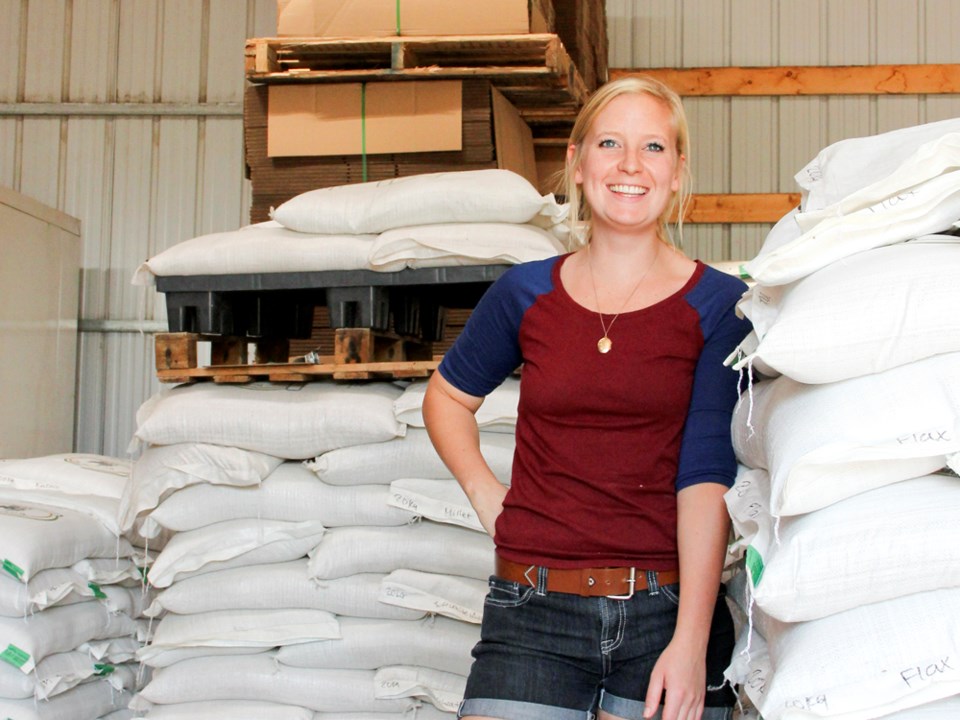Food is the perfect target of big industry, because we all need something to eat every day. But as the industry has grown and changed, there has been a growing group of producers who cling to age-old traditions, believing that growing and distributing food is best managed from a community perspective that maintains quality and sustainability at its core.
While there are many off shoots of the produce local, buy local mindset, one of those movements is Slow Food. As North Portal’s Nicole Davis explains it, slow food is the counterweight to fast food.
Though she runs the Daybreak Mill, an organic mill outside of North Portal, Davis is connected to the Slow Food organization through the chapter in Saskatoon.
At the end of October, she attended Terra Madre, translated as Mother Earth, as Saskatchewan’s Slow Food delegate. The conference included more than 3,000 delegates, representatives, press and public who wanted to see what ideas would be spawned this year. Pope Francis sent a greeting to the participants and United States First Lady Michelle Obama, an advocate of healthy eating, provided a video message.
First held in 2004 and every two years since then, Terra Madre was hosted in Turin from Oct. 23 to 27.
Slow Food was created in 1986 by Italian Carlo Petrini, born out of his and others protests against the installation of a MacDonald’s near the Spanish Steps in Rome.
It’s no secret that families and individuals are eating less food made in the home, and almost no food produced by individual households. Gardens are an almost entirely forgotten addition to a property, more meals are eaten outside the home and of the meals eaten at home, an unhealthy portion are simply heated up in the microwave or oven. The amount of actual kitchen time required to prepare supper is always shrinking. It’s getting faster, but what Slow Food and others are warning, is that the increased efficiency isn’t doing anything to increase our health or gastronomic experience.
“Slow Food is the opposite of fast food. It’s about getting back to growing your own food or knowing the people who grow your food, cooking with your family. Sitting down and enjoying your meal, not eating on the go. It’s about really taking the time to enjoy what you’re eating and realizing that it’s nourishing your body,” said Davis.
“There are Slow Food groups all over the world,” she added. “(The Saskatoon group) sent us over there, and there’s food and drink from all over the world. It was a massive event.”
There were plenty of workshops for the attendees to take part in, and Davis went to one in particular about the Slow Food Youth Movement, which Petrini spoke at.
“He talked about how he feels good leaving the slow food movement in the hands of the youth and all the cool things they’re doing.”
Another session was presented by celebrity chef Jamie Oliver.
Davis said on the trade floor there was representation from every participating country showing off the wares from each part of the world. There were another three areas showcasing three distinct areas of Italy with an emphasis on some of their local products like olive oil and wine.
“There are a lot of things in our food system that are just not right. There are a lot of things that should probably be changed,” said Davis.
The trend away from mass-produced food from factory farms and processing plants is slowly making its way into southeastern Saskatchewan and the Estevan area. The Farmers’ Market has been a Saturday morning staple for years, but another step was taken this summer with the addition of a community garden in the city.
“I would definitely like to start something up in Estevan,” said Davis, who has already approached health-food businesses in the city about creating a local chapter. There are 33 Slow Food chapters across Canada, but Saskatoon is the only one in Saskatchewan.
“A really cool thing that Slow Food does is that they’re really relaxed. You don’t have to have meetings and take minutes. It’s as simple as having a potluck dinner with friends and talking about things you can do,” said Davis, who said groups may have two or three events a year.
One of the things she said the group could do is make Disco Soup, which is made from produce at local grocery stores that is never put on the shelves because it is bruised or showing some other blemish that makes it less desirable to most consumers.
“It’s edible, but you just don’t see it. They go and they get this food from grocery stores, they cut off the bruised parts and put it in the soup and have a party about it. Everybody who comes gets a free meal and learns about food waste and how, maybe, it’s not so necessary.
“We don’t have a lot of options available yet, but there are a lot of people who are super interested in learning more about their food, getting more connected with what’s on their plate. I do see it as a growing movement in Estevan,” added Davis, who expects it to continue to grow.
Those who are interested in learning more about their food and the Slow Food movement may contact Davis at [email protected]




